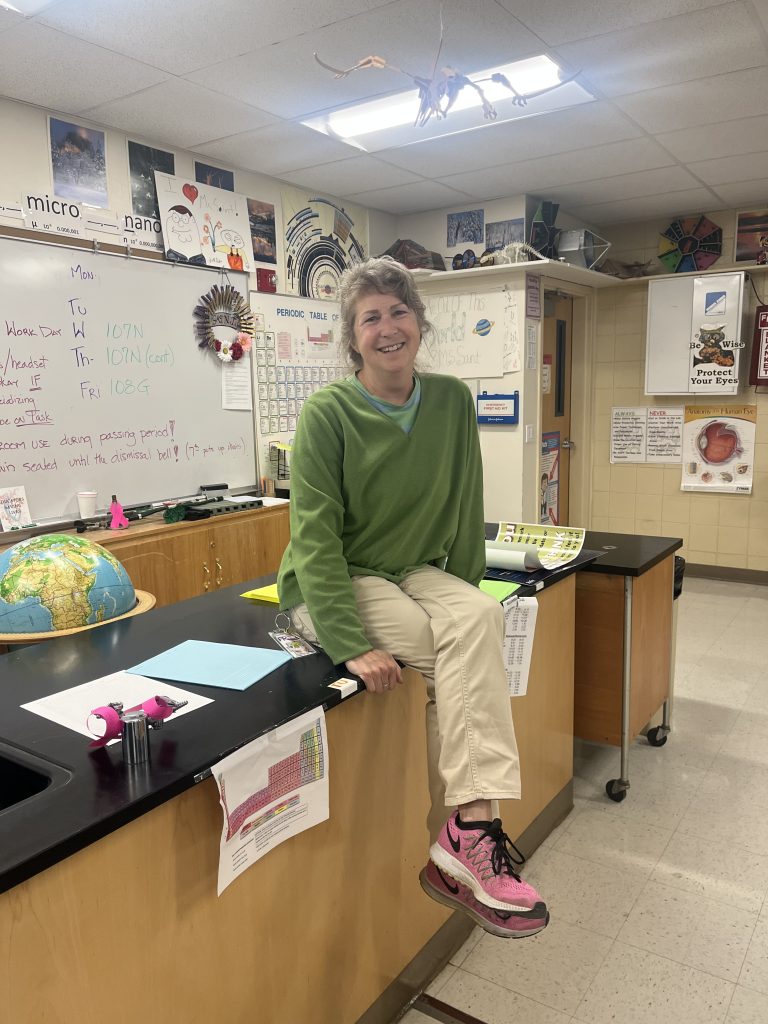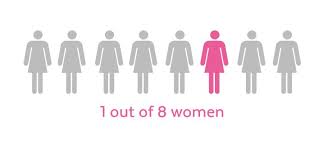Despite EHS science teacher Debra St. Hilaire’s—referred to as Saint by staff and students—recent diagnosis with breast cancer, she is approaching life positively and wants to show kids that you can be sick and still embrace life!

Saint described her situation:
“I had breast cancer in 2007 and it was an estrogen positive form of cancer. So, just biopsy, lumpectomy, and one lymph node removed. And then I had chemo, radiation, and then I was on a Rubidex for 10 years… This one is estrogen negative. It’s a different cancer and it’s HER negative. I have two oncologists; I have my primary oncologist and surgical oncologist, in case I need surgery. And they think that it’s different and I have had pain in my side since October, they think that the cancer is actually systemic throughout my body. So I may not have surgery, I may have something that treats the entire body.
“They ordered a PET scan, which I will have on the [June] 13th and that will show cancer wherever it is. So it will look at my bones, it will look at all my organs, and from that then they will decide what to do. So if it is only right here, [right side] isolated right here, same breast, but different location, then it may be surgery, I’m not sure. But it’s in a weird location. And they think it’s through the chest wall. They think it has actually gone through underneath. Where it’s located is a thick mass here.
“So, their goal is to keep me alive for 5 years, in hopes that technology will catch up and that they’ll have better treatments. And then keep me alive for another 5 years, hopefully, or they’ll come up with a treatment that can actually just remove systemic cancer, but right now they don’t have that. So, it’s kind of up in the air until we get the PET scan back.”
There are four stages of cancer. Stage I is the first stage and means that the cancer is localized and hasn’t spread to lymph nodes and other tissues. Stage IV is the worst stage and means that the cancer has spread to other areas of the body.
“They don’t know the stage because that depends on the type and size of the cancer. So, yeah, I won’t know that for a while,” Saint said.
There are many ways to treat cancer. Some of the treatments include chemotherapy, surgery, radiation, bone marrow transplant, and hormone therapy. There are many side effects to treatment, which includes anemia, nausea and vomiting, as well as pain and fatigue.
“The treatment they think so far, if it is systemic, will be chemo and other drugs. And it would be a drip chemo, which is what I had the first time. So the side effects of that are pretty icky. You get neuropathy, that means you lose the neural use, the neurons, in your extremities. And the first time I got it I was, at some points, unable to pull my foot up, so if I was hiking or running my foot would drop and I’d go trip and go flying off the trail. And then you lose the sensation in the ends of your toes and sometimes the end of your fingers. So that’s what neuropathy is, the neurons kind of die. So that’s one thing that could happen.
“I might lose less hair with this chemo. The last time I lost basically all of it, but I don’t know how much better losing less hair is. Cause you don’t want to do the partial hair, partial not hair. So I may end up going bald again, you know just shaving it. It’s not supposed to make me quite as sick as the first one did. The first one I could barely just walk for a week after treatment. And I was doing my grad program for education when I was doing all the treatment, so it made it really difficult. At least with this go around it will be summer, so I don’t have to worry about the stress of teaching or studying, which will be nice.
“I really feel lucky that I have two oncologists, it just happened that way and it made a big difference because they’ve been able to confer about this and I’m really glad that they’re looking through my whole body because they’re have been other issues,” Saint continued.

Breast cancer death rates have been steadily declining since 1989, with an overall decline of 43% and a 1 in 39 chance that a woman will die of breast cancer.
There are more than 3.8 million breast cancer survivors in the U.S. This includes those still being treated and those that have completed treatment.
There is a chance of having a recurrence of cancer. Women with early breast cancer often develop local recurrence in the first five years after treatment. Commonly, 7 to 11% of women with early breast cancer are likely to experience a local recurrence during this time.
“I have a lump right here [right side] and this whole area right here is thick, it’s really high and it’s not on the other side. And then this one lump right here. So, I had lumps just the last couple of years and they were causing pain and they looked at them. They took all sorts of scans and they said it’s just a cist, so it was pressure that was causing a little pain. And I said ‘ignore the pain’ and they said ‘yeah.’
“So I had continued pain and I’d been ignoring it. But then when this new lump popped up, about a month-and-a-half or two months ago, I, you know, made appointments to go in. And, so the needle biopsied it. They numb you up with like Lidocaine shots all over the place and then the needle passes through it, (a long needle, it’s a really long needle), and then they get whatever tissue can get inside that needle, (it’s a hollow little tube) and then when they pull it out they get all the cells in there and he did, I think, four or five samples. So he did it four or five times through that little mass, to make sure he got enough cells,” said Saint.
A study showed that of 1,433 cancer patients from the ages 25 to 62, 59% of men and 61% of women continued working during treatment. Of the ones who stopped working, most came back within the first year.
“I do plan on continuing teaching, for sure. I don’t know if I’ll still be sick in the fall and need a sub, I hope not. But the timing on this is actually kind of perfect. So I’ve missed a couple days of school this spring, with doctors appointments, but the PET scan on the [June] 13th, if it comes back that it is systemic and I need treatment, I’m hoping that that will start immediately, so I might miss a day or two, but that might be it cause we’re out on the [June] 16th. The timing is amazing. I plan on teaching until I retire in 2025, so this time in 2 years,” Saint explained.
Many people experience depression, anxiety, or PTSD with a cancer diagnosis. This can fade for many when a treatment plan is settled. Depression occurs in roughly 20% of cancer patients, while 30% of cancer patients experience anxiety, according to the OHSU Knight Cancer Institute.
“As far as how I’m handling this, we’re animals, we’re born and we die. So nothing’s guaranteed. You know you always want to live until you don’t, you know, whatever. But, I really don’t focus on negative stuff. And so, yeah I know I have cancer, but I hike every morning, hike or run every morning. I get my morning soak in my hot tub. I do that before I go running. Then I get home and shower. I have my coffee. And then I leave for work and I get here early so I can do some work.
“Then I get to be here with the kids all day. And so they don’t realize the effect they have on me but I’m able to give them love and they’re able to give me love and that has kept me going as a teacher. It’s a incredible experience and I just love it. So that’s a huge part of my day. And, then, you know, an evening walk. I have a great life so I don’t focus on this. I just keep going, doing the other stuff that I do. When I get the test results I’m assuming that I’ll be a little emotional for a day or two, but chances are that’s it,” said Saint.
Families are also affected with cancer diagnosis’. They often experience worry, sadness, and anger. They may also act differently, acting very supportive or they may treat one differently.
“My son has been through this with me before. He was ten when I had cancer the first time. So, for me, there was no option, you just go through it and survive. You know, I didn’t even consider not surviving. He’s 26 now and he’s really supportive. My siblings are all my age and if you’ve lived this long then you’ve had either emotional trauma or medical issues. Everyone has had their own stuff, so we all know that life is precious and you live it as much as you can, as positive as you can. So, I think that came from my parents.
“There are always unknowns and we’ve all lived full lives with serious medical issues. If you live you ‘deal’ with stuff, whether medical or other trauma… They take it as it comes and there’s no reason to make it worse by festering on it,” the EHS teacher explained.
Saint wanted to express one last thing to students:
“People live and die every day. And I think it’s really important for kids to see someone go through this and continue to embrace life. Life’s really short and it can be really amazing. Focus on the amazing and consciously WALK AWAY from the icky! And love fully!”
After this story was written, Saint sent out an update to staff with new information she got from her PET scan.
“I have cancer in my spine, pelvis floor, hip, and Lung area. It is believed the cancer is not the source of the chronic pain in my R side, but that the pain is associated with my shingles (lying just over it). I begin pill chemo on Monday, yay!!! And get a lung biopsy in a few weeks to determine if the cancers are the same.”
Falcon News reached out to EHS staff and students to get their reactions to this news.
Librarian Tessa Slager
Answer: “I was really shocked, but overall hopeful! She is such a strong woman, both mentally and physically. I know she has the full support of our ‘staff family’ here at EHS. She’s family and we take care of each other!”
Principal Rick Gardner
A: “I was very saddened to hear that Ms. Saint was going through this again, but I also conveyed to her that the school is here to support her in any way possible. I know that she is a very strong person and a survivor. I think she will draw strength from her students and colleagues here at Elmira and we will do all that we can to help her as she battles through this illness.”
Options Director Forrest Cooper
A: “I know how much energy it takes to continue in a profession like teaching, and I was really surprised she was able to push through the entire process without really interrupting the student experience. Clearly she cares deeply about her students and her classes. Ms. St. Hilaire is a great teacher!”
Freshman Rylee Rice
A: “I was obviously shocked, and scared for her. But, Ms. Saint is strong and she will get through this again.”
Freshman TyRay Chacon
A: “I never thought I would hear that from her, but I think it is really good that she is staying really positive and just know we all appreciate you.”
Freshman Michael Gomez
A: “The most emotion I felt when I heard it was that I was shocked at how calm she was, like she was brave. I am praying for her that she gets a speedy recovery and that everything will be the best it could.”
Freshman Caleb Breding
A: “I think it’s sad that it has happened to her twice yet alone once. Nobody should have to go threw something that scary. I hope she stays strong and fights threw it one more time.”
Freshman Ava Greene
A: “My heart dropped when Ms. Saint told us the news. I have family relatives that have had this type of cancer before and it’s very frustrating. I’m sending out prayers for her and that she is one of the strongest people I know.”
Freshman Easy Armstrong
A: “It is really sad to hear that she is having to go through this when she has already beaten cancer once. Ms. Saint is a very energetic and upbeat person and I’m happy to see that she is still engaged and working with the class even with all that is going on in her life.”
In the U.S. each year, roughly 264,000 cases of breast cancer are diagnosed in women and 2,400 cases are diagnosed in men. The estimated number of new cases of cancer in Oregon so far this year has been 26,030, while the estimated new cases of breast cancer in Oregon is 4,220 for females.
Excluding skin cancer, breast cancer is the most common cancer in women in the U.S.
The biggest risk factors for getting breast cancer are being a woman and aging. Women have the highest probability of developing breast cancer between the ages of 60 and 69 at 3.5%.



